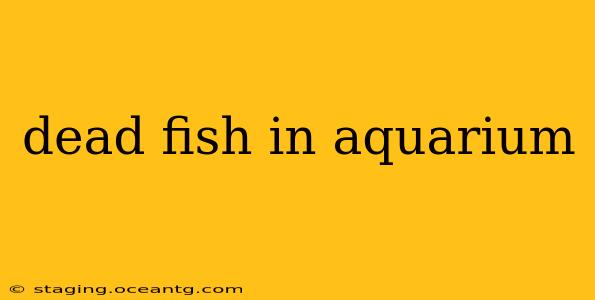Finding a dead fish in your aquarium is upsetting, but it's a relatively common experience for fish keepers. Understanding the potential causes can help you prevent future losses and maintain a healthy environment for your remaining aquatic companions. This guide will explore the most common reasons for fish deaths, how to prevent them, and what steps to take when you discover a deceased fish.
Why is My Fish Dead? Common Causes of Fish Death
Several factors can contribute to the death of a fish in an aquarium. Identifying the root cause is crucial for preventing further losses. Here are some of the most frequent culprits:
-
Poor Water Quality: This is the most common reason. Ammonia, nitrite, and nitrate buildup are toxic to fish. Insufficient filtration, infrequent water changes, and overstocking are major contributors to poor water quality. Regular testing and maintenance are essential.
-
Disease: Fish, like any other living creature, are susceptible to diseases. Bacterial, parasitic, or fungal infections can quickly weaken and kill fish. Quarantine new fish before introducing them to the main tank to prevent the spread of disease.
-
Sudden Temperature Changes: Fish are sensitive to temperature fluctuations. Rapid changes can shock their systems and lead to death. Maintain a stable temperature within the recommended range for your fish species.
-
Aggressive Tank Mates: Incompatible tank mates can lead to stress, injury, and ultimately, death. Research the temperament and space requirements of your fish before introducing them together.
-
Improper Diet: An unbalanced or insufficient diet can weaken a fish's immune system, making it more vulnerable to disease and stress. Provide a varied diet appropriate for your fish species.
-
Toxicity: Exposure to toxins, such as heavy metals from tap water or cleaning products, can be lethal. Always use dechlorinator for tap water and avoid using harsh chemicals near your aquarium.
-
Old Age: While less common in younger fish, old age can contribute to mortality. Some fish have shorter lifespans than others.
How Do I Prevent My Fish From Dying?
Preventing fish deaths involves proactive aquarium management:
-
Regular Water Changes: Perform partial water changes weekly or bi-weekly to remove waste and maintain water quality. The frequency will depend on the size of your tank and the number of fish.
-
Proper Filtration: Invest in a high-quality filter appropriate for your tank size. Ensure the filter media is cleaned or replaced regularly according to the manufacturer's instructions.
-
Accurate Water Testing: Regularly test your water for ammonia, nitrite, and nitrate levels. Use a reliable test kit and adjust water parameters as needed.
-
Appropriate Tank Size and Stocking: Don't overcrowd your tank. Research the space requirements of your fish species and ensure you have enough room for them to thrive.
-
Quarantine New Fish: Always quarantine new fish for at least two weeks before introducing them to your main tank to observe for signs of disease.
-
Provide a Balanced Diet: Feed your fish a varied diet that meets their nutritional needs. Avoid overfeeding, as uneaten food contributes to poor water quality.
-
Maintain Stable Temperature: Use a reliable heater and thermometer to maintain a consistent water temperature.
-
Regularly Inspect Your Fish: Observe your fish daily for any signs of illness or stress, such as lethargy, loss of appetite, or unusual behavior. Early detection can increase the chances of successful treatment.
What Should I Do If I Find a Dead Fish?
If you find a dead fish, take the following steps:
-
Remove the fish immediately: To prevent water contamination and avoid stressing other fish. Use a net to carefully remove the fish from the tank.
-
Perform a water change: A partial water change will help dilute any toxins released by the dead fish.
-
Test your water parameters: Check ammonia, nitrite, and nitrate levels to identify potential issues.
-
Examine the fish (optional): If possible, examine the fish for any visible signs of disease or injury. This can help determine the cause of death.
How Long Does it Take for a Dead Fish to Decompose in an Aquarium?
The decomposition time for a dead fish in an aquarium depends on factors like water temperature, tank size, and the size of the fish. At warmer temperatures, decomposition happens faster. A small fish might decompose within a day or two, while a larger fish could take several days or even a week. Prompt removal is crucial to prevent water quality issues.
Can a Dead Fish Cause Other Fish to Die?
Yes, a dead fish can cause other fish to die. The decaying body releases toxins into the water, which can quickly contaminate the environment and make other fish ill. Prompt removal is essential to prevent secondary deaths.
By understanding the common causes of fish death and implementing preventative measures, you can significantly improve the chances of maintaining a thriving and healthy aquarium environment for your beloved aquatic pets. Remember, proactive care and regular maintenance are key to the success of any aquarium.
